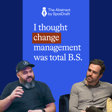
Ep 33: Legal Issues in the Gene Editing Space: Lisa Taylor Ash, General Counsel at Shape Therapeutics
How do you leverage your legal career to launch your own consultancy? What are the winning tactics to be an effective in-house lawyer? Is it possible to merge your love of science with your passion for law?
Lisa Taylor Ash, General Counsel at Shape Therapeutics, has the answer to all of your questions. After leading two different legal teams through major acquisitions, starting her own consulting firm, and returning to the GC role, Lisa created effectiveinhouse.com, a website that features legal tactics, samples, and interviews with top in-house counsels across a variety of industries.
Hear Lisa as she explains how she was able to position her career at the forefront of cutting-edge biotech, offers practical advice for lawyers hoping to start a company, shares lessons she wishes were taught in law school, and more.
Check out some of Lisa’s favorite posts from effectiveinhouse.com below:
Minimize Legal Risk
https://effectiveinhouse.com/minimize-legal-risk
Interview with Brett Pletcher, Former GC of Gilead
https://effectiveinhouse.com/interview-brett-pletcher
Interview with Brandon Etheridge, GC of the Baltimore Ravens
https://effectiveinhouse.com/interview-brandon-etheridge
Read detailed summary: https://www.spotdraft.com/podcast/episode-33
Topics:
Introduction: 0:00
Leading legal through two major acquisitions: 2:48
Developing personalized medicines: 8:56
Lessons for lawyers dealing with M&A: 12:11
Leaving large companies after an acquisition: 14 :06
Launching an independent consulting firm: 15:51
Offering practical advice for starting a consulting business: 19:39
Returning to an in-house role at Shape Therapeutics: 24:37
Legal issues related to gene editing: 30:47
Building public trust in gene therapy companies: 32:57
The future of AI and gene editing: 35:41
Creating an essential legal resource at effectiveinhouse.com: 36:51
Book recommendations: 41:35
What you wish you had known as a young lawyer: 44:03
Connect with us:
Lisa Taylor Ash - https://www.linkedin.com/in/lisa-taylor-ash-17b1b611/
Tyler Finn - https://www.linkedin.com/in/tylerhfinn
SpotDraft - https://www.linkedin.com/company/spotdraft
SpotDraft is a leading CLM platform that solves your end-to-end contract management issues. Visit https://www.spotdraft.com to learn more.



















